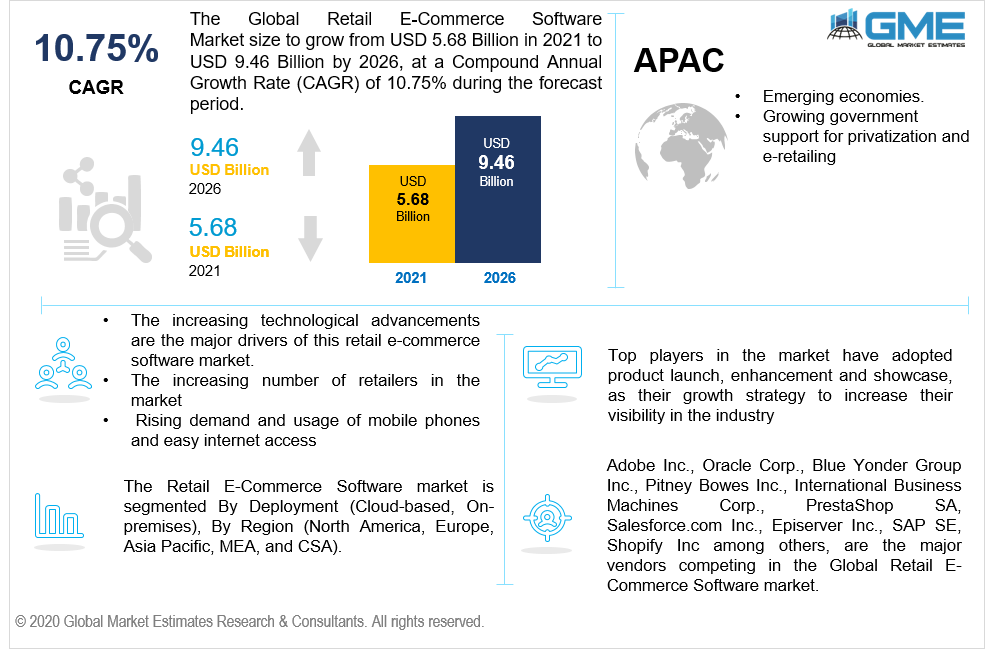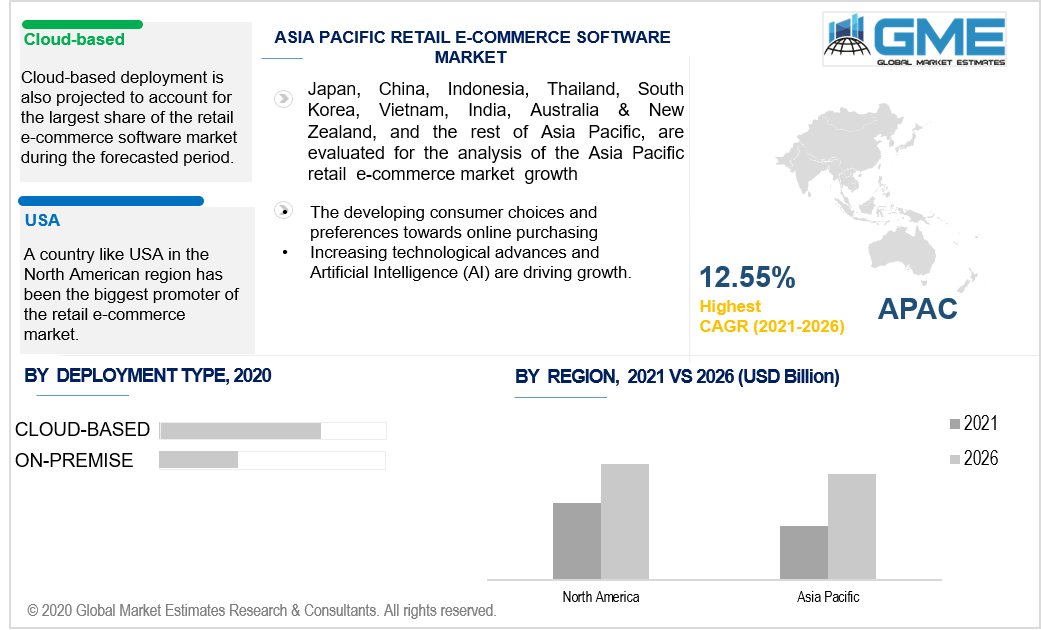
Global Retail E-Commerce Software Market Size, Trends, and Analysis - Forecasts to 2026 By Deployment (Cloud-based, On-premises), By Product (Groceries, Apparels & Accessories, Footwear, Personal & Beauty Care, Furniture and Household Decor, Electronic Goods, Others), By Region (North America, Europe, Asia Pacific, MEA, and CSA).
The global market has witnessed massive demand and acceptance over the last few years. This software market has helped a lot of retailers to expand their business outside the boundaries. Many retailers are being able to reach out to their customers sitting at the opposite end of the world. It has enabled the retailers to efficiently manage their inventories, adjust prices, figure taxes, process and calculate other transactions. The software is enabling small-scale retailers to increase their customer base through online sales and transactions.
The market is projected to have a growth rate of 10.75% over the forecast period. Data and figures have shown that more than 50% of the population worldwide prefer online retail shops compared to offline systems. The e-commerce retail business has fuelled the need for e-commerce software. This bandwagon effect has pulled thousands of retailers into the e-commerce software market, enabling them to have profitable sales. Managing and fulfilling customer’s needs is an essential aspect of business development. The e-commerce software opens up a huge window for retail entrepreneurs to showcase their business ideas and develop a strategic retail business. Retailers gain a huge platform to plan their marketing strategies. This medium results in 24 hours open of a retail store, which gives the customers a scope to shop at their convenience, thus giving effective customer service and a customer-friendly experience.
Irrespective of business strategies and marketing plans, what makes this software a huge success is advancing technology. Without incorporating technology, electronic or internet commerce had not gained much attention. Technology has brought various sources through which a customer can access the retail shops at any hour of the day. Along with technology, the Internet of Things (IoT) and Artificial Intelligence have enabled retailers to know the preferences and choices of their customer base in detail. Retailers get an in-depth idea of who their customers are and AI assists them to track their customer’s preferential goods baskets. This software also forms a centralized location to store all the customer details and their past transactional records.
The on-going pandemic of COVID-19 has brought exceeding growth in the retail e-commerce software market. The lockdown has propelled the consumer base and the retailers to sell the products online, avoiding physical contact. The stringent rules and regulations during the pandemic led to the shutdown of many shops, malls, and warehouses. However, this retail e-commerce software market with its online sale and transactions has saved many retail businesses from facing huge losses, thus, keeping up their sales and bringing positive change in the world economy.

The retail e-commerce software works through two kinds of deployment modes, the cloud-based and the on-premise model. Cloud-based deployment mode assists the service providers, who are the retailers in this specific market, to reach out to the mass population in considerably less time with a very smooth management base. This results in higher preferences for cloud-based deployment than for the on-premise deployment model.
This mode also ensures the customers a customer-friendly experience. Centralized location under the cloud-based system for storing customers enlarges the storage size, thus enhancing the management and maintenance procedures for the retailers. This cloud-based e-commerce software also provides a cost-effective platform for retailers to sell their goods. It also enables the software to be secure to use for the customers.
Cloud-based e-commerce software makes it easy for the retailers to focus on their products and fulfill the customer’s needs, the remaining operational procedures and systems are managed by the host-providers. Whereas, through the on-premise deployment model, the retail company has to pay attention and manage the whole online system as well as scale up their product qualities. Thus, cloud-based deployment mode gets an upper hand over on-premise deployment owing to its ability to ensure efficiency.

North America will dominate and occupy the major share in the market. This has resulted in a corresponding monopoly in the retail e-commerce software market as well. Many e-commerce software companies have their origin in North America. The USA in the North American region has been the biggest promoter of the retail e-commerce market. We can consider the examples of huge retailers like Walmart, Kroger Co among others who are the largest investors in the retail e-commerce software market. The governments of countries in the North American region support and encourage budding retailers to opt for e-commerce software. Thus, making North America the largest hub of retail e-commerce market compared to the rest of the world.
However, the Asia-Pacific region is gradually picking up its pace and achieving new growth rate peaks rate since the last couple of years. Countries like China, India, Korea, and Japan are becoming the new focus of the retail e-commerce software market. The government of these countries is encouraging e-commerce software in retail businesses to achieve more profits. The governments in a few of the APAC countries are looking at privatization and capitalism. This has also accelerated the rate of funds and money flowing into this market in recent years. Eliminating all the barriers to entry, new retail entrepreneurs are progressively capturing the market. The increased belief about independence and demand for self-made/country-made goods and products are also encouraging new entrepreneurs to invest in the retail e-commerce software market.
The developing consumer choices and preferences towards online purchasing, along with increasing technological advances and Artificial Intelligence (AI) are driving growth.
Adobe Inc., Shopify Inc, Oracle Corp., SAP SE, Blue Yonder Group Inc., Episerver Inc., Pitney Bowes Inc., Salesforce.com Inc., International Business Machines Corp., and PrestaShop SA among others, are the key players.
Please note: This is not an exhaustive list of companies profiled in the report.
In 2019, Shopify Undertook an e-commerce platform of Handshake Corp. Shopify aims to improve its B2B e-commerce sector business.
In September 2019, SAP SE launched the “Foundry” program in Germany. This program improves and brings efficiency in customer experience and commerce cloud solutions.
We value your investment and offer free customization with every report to fulfil your exact research needs.
The Global Retail E-Commerce Software Market has been studied from the year 2019 till 2026. However, the CAGR provided in the report is from the year 2021 to 2026. The research methodology involved three stages: Desk research, Primary research, and Analysis & Output from the entire research process.

The desk research involved a robust background study which meant referring to paid and unpaid databases to understand the market dynamics; mapping contracts from press releases; identifying the key players in the market, studying their product portfolio, competition level, annual reports/SEC filings & investor presentations; and learning the demand and supply-side analysis for the Retail E-Commerce Software Market.

The primary research activity included telephonic conversations with more than 50 tier 1 industry consultants, distributors, and end-use product manufacturers.

Finally, based on the above thorough research process, an in-depth analysis was carried out considering the following aspects: market attractiveness, current & future market trends, market share analysis, SWOT analysis of the company and customer analytics.

Tailor made solutions just for you
80% of our clients seek made-to-order reports. How do you want us to tailor yours?
OUR CLIENTS